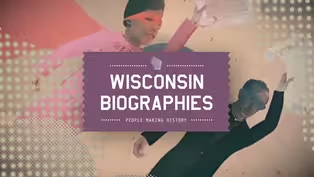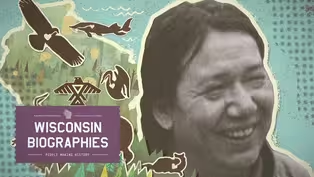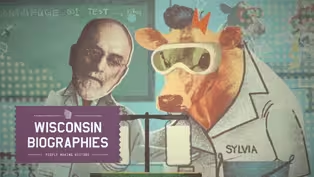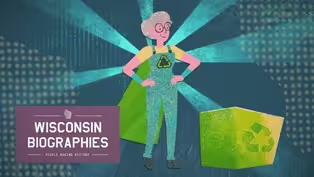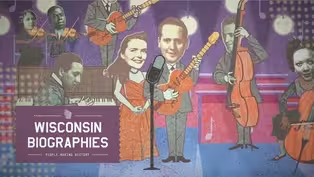
Electa Quinney: Mohican Teacher and Mentor
Special | 6m 42sVideo has Closed Captions
Learn about the life of Electa Quinney, Wisconsin's first known public school teacher.
Electa Quinney was Wisconsin's first known public school teacher, and a notable mentor in the Mohican community. Learn how Electa and the Stockbridge-Munsee Mohicans used both traditional Native and non-Native education to keep their traditions alive and preserve their ways of life.
Problems playing video? | Closed Captioning Feedback
Problems playing video? | Closed Captioning Feedback
Wisconsin Biographies is a local public television program presented by PBS Wisconsin
Timothy William Trout Education Fund, a gift of Monroe and Sandra Trout.

Electa Quinney: Mohican Teacher and Mentor
Special | 6m 42sVideo has Closed Captions
Electa Quinney was Wisconsin's first known public school teacher, and a notable mentor in the Mohican community. Learn how Electa and the Stockbridge-Munsee Mohicans used both traditional Native and non-Native education to keep their traditions alive and preserve their ways of life.
Problems playing video? | Closed Captioning Feedback
How to Watch Wisconsin Biographies
Wisconsin Biographies is available to stream on pbs.org and the free PBS App, available on iPhone, Apple TV, Android TV, Android smartphones, Amazon Fire TV, Amazon Fire Tablet, Roku, Samsung Smart TV, and Vizio.
More from This Collection
Wisconsin Biographies tells the stories of notable Wisconsinites who have made history. Featured in this compilation: Mohican teacher Electa Quinney, Chippewa activist Walter Bresette, electric guitar pioneer Les Paul, dairy scientist Stephen Babcock and recycling revolutionary Milly Zantow.
Video has Closed Captions
Wisconsin Biographies tells the stories of notable Wisconsinites who have made history. (26m 49s)
Walter Bresette: Treaty Rights and Sovereignty
Video has Closed Captions
Bresette spoke on tribal sovereignty, American Indian treaty rights, and the environment. (4m 10s)
Stephen Babcock: Agriculture’s MVP
Video has Closed Captions
Stephen Babcock invented the Babcock Test at the University of Wisconsin–Madison. (5m 4s)
Milly Zantow: Recycling Revolutionary
Video has Closed Captions
Milly Zantow changed recycling in Wisconsin and the world. (5m 44s)
Les Paul: The Search for the New Sound
Video has Closed Captions
Les Paul’s groundbreaking music techniques are still used today in the music industry. (4m 40s)
Providing Support for PBS.org
Learn Moreabout PBS online sponsorship[lively string music] [flute music, horse snorting] - Narrator: Electa Quinney was heartbroken to leave her home.
She was barely ten years old, and she and five other Mohican girls were going far away to school.
It would be a long time before they would see their families again.
But they knew that education was their best chance at surviving.
To understand why, we have to go back to the years before Electa was born... Electa and her family were Mohicans.
The Mohicans lived in a thriving community in the state now known as New York.
But by the 1700s, more and more European invaders were coming to America to seize land and resources.
Colonization, war, and European diseases decimated the Mohican population and homelands.
In order to survive, the Mohicans were forced to move.
In the 1730s, they decided to live alongside some English colonists and form the town that became Stockbridge, Massachusetts.
There, the Stockbridge Mohicans raised families, farmed and hunted, and participated in town life.
When the Revolutionary War broke out, the Stockbridge Mohicans fought alongside the colonists against the British.
The American colonists promised to let them keep their lands in return for this service.
But after the war, they broke this promise and forced the Stockbridge Mohicans off their land and out of their homes.
Again.
Another tribe— the Oneida— offered the Stockbridge Mohicans a place to live in New York State.
So, they moved there and started rebuilding their community.
They called their new home New Stockbridge.
In 1797, several Stockbridge Mohican families sent their daughters to live and study with non-Native families.
Over several years, the girls learned reading, writing, and arithmetic, as well as crafts like knitting and how to make cheese and butter.
Their parents explained that a combination of Native teachings with a non-Native education would help the community understand and negotiate with the American colonists.
Doing this would be key to their survival.
Back in New Stockbridge, the girls then shared what they'd learned.
One of them, Mary Peters Doxtator, opened a school for Stockbridge Mohican girls.
They produced cloth that they could sell.
The students would then share their profits to help care for the whole community— an important Mohican value.
Stockbridge Mohicans invested years building New Stockbridge.
Sending Electa and the other girls away to school was part of their work to keep this as their home.
But the New York state government and businesses were working hard to remove all Native people from the state.
Reluctantly, the Stockbridge Mohicans were forced to make their most devastating move yet—- into the unknown.
In the early 1820s, the Stockbridge Mohicans began their journey to the area that is now Wisconsin, where they signed a treaty with the Ho-Chunk and Menominee for some land.
They could only bring their most important possessions, and they had no way of knowing what life would be like so far from their homelands.
But the love of their people was so strong that they committed to doing what was necessary to ensure a better life for future generations of the Mohican Nation.
Electa Quinney was one of the people who helped carry Mohican traditions to Wisconsin from their homelands in the east.
When she arrived in Statesburgh, now Kaukauna, in 1828, the Stockbridge Mohican community was busy rebuilding.
That summer, Electa started teaching in Statesburgh.
That made her— a Native woman— the first known person to teach public school in the area that became Wisconsin.
Yes, the first!
She taught reading, spelling, math, and public speaking to Native and non-Native students alike.
Having a Native teacher at a school open to all students was an important sign of the Stockbridge Mohicans' generosity at work.
This was a big responsibility for Electa, but she came from a long line of tribal leaders, historians, diplomats, and educators.
Electa lived out her life as a cherished Mohican elder on a farm in the community.
When she died around 1885, she could rest knowing she had done her part to uplift her Nation in the face of great obstacles.
Today, the Mohicans in Wisconsin call themselves the Stockbridge-Munsee Band of Mohicans, and their reservation is in Shawano County.
They continue to be inspired by Electa Quinney.
Electa lifted up Native and non-Native people.
She taught not only school lessons, but demonstrated how to build a better society.
Her generosity is a defining Mohican value— one that the Stockbridge-Munsee Band of Mohicans are still known for today.
♪ ♪ ♪ She came here to teach us ♪ ♪ Her spirit still reaches ♪ ♪ Electa, you taught us so well ♪ ♪ Way ah ay ah way ah ay oh ♪ ♪ She came here to teach us ♪ ♪ Her spirit still reaches ♪ ♪ Electa, you taught us so well ♪ ♪ Way ah ay ah way ah ay oh ♪
Support for PBS provided by:
Wisconsin Biographies is a local public television program presented by PBS Wisconsin
Timothy William Trout Education Fund, a gift of Monroe and Sandra Trout.
